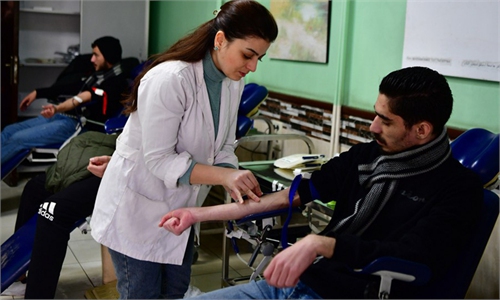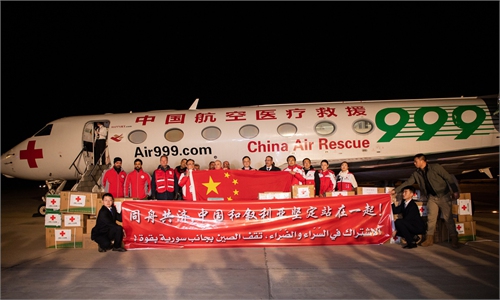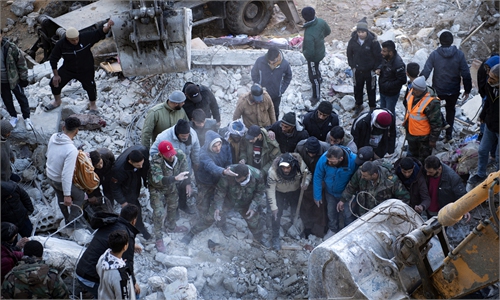Calls mount urging US to lift sanctions on Syria to facilitate humanitarian aid
First batch of aid from China arrives at Damascus

An aerial view shows collapsed buildings in Hatay, Turkey on February 7, 2023 after a 7.8-magnitude earthquake and strong aftershocks jolted Turkey and neighboring Syria the previous day. More than 5,000 were killed and more were injured as of press time. Photo: VCG
The first batch of assistance from China arrived in earthquake-stricken Syria amid a wave of international humanitarian aid, but some of the most needed supplies, including medicines and food, have been blocked due to the US embargo, prompting mounting calls for the US to show sympathy to Syrians and lift sanctions against the country.
More than 22,000 were killed in Turkey and Syria as of press time Friday after catastrophic earthquakes struck the two countries earlier this week.
China's first shipment of medical assistance arrived in Damascus on Thursday, with more on the way, the Global Times has learned.
Chinese Foreign Ministry spokesperson Mao Ning said at a regular press briefing on Wednesday that China will provide emergency humanitarian aid worth 30 million yuan to Syria, which includes cash assistance of 2 million US dollars and relief materials urgently needed.
Aid from countries including Iran, Iraq, Jordan, the United Arab Emirates, Oman, Egypt, India and Venezuela has also arrived. Six trucks carrying "shelter items and non-food item kits, including blankets and hygiene kits" from the UN arrived the same day.
However, the UN special envoy for Syria said on Thursday that earthquake-affected regions had received "nowhere near enough" lifesaving aid and warned that assistance must not be "politicized."
The UN Refugee Agency told the Global Times on Friday that 10.9 million people have been affected by the earthquake in northwestern Syria. The immediate needs include food, shelter, non-food items and medicines.
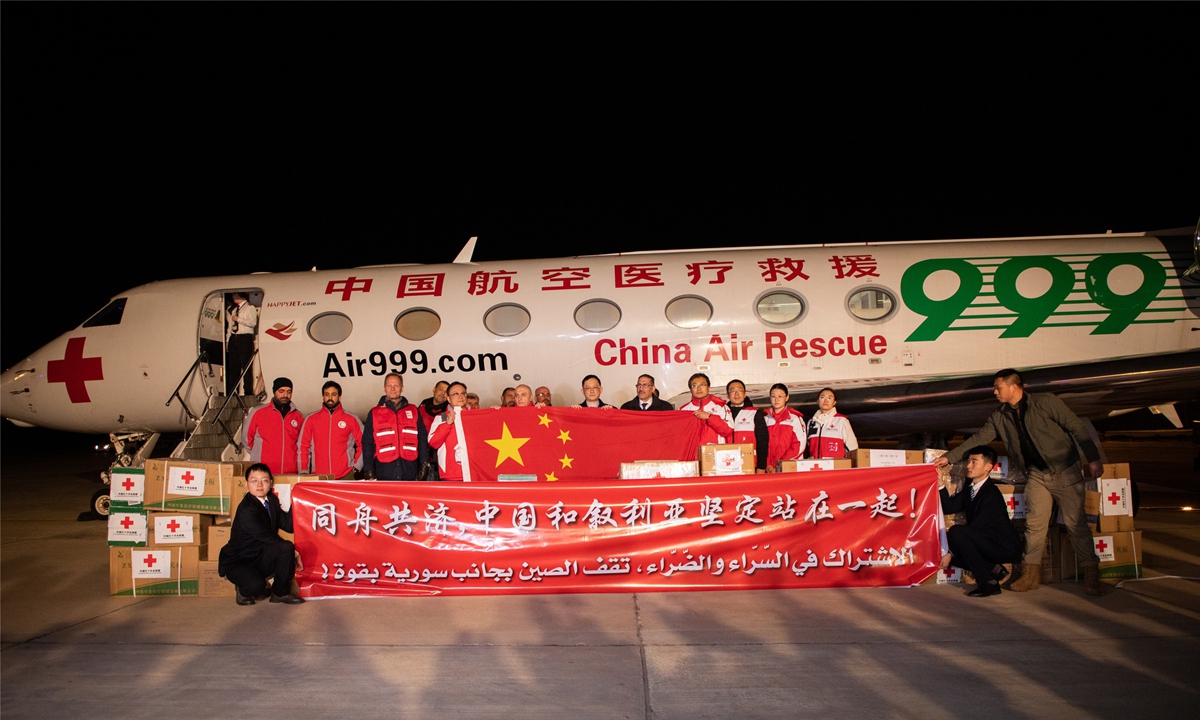
China's first batch of medical assistance arrived at Damascus around 7:30 pm on Thursday with medicines and supplies for the use of 5000 personnel and more supplies and medical equipment are on the road to the earthquake-hit country. Photo: Xue Dan
Urgent call for US to lift sanctions
After being racked by wars for more than 10 years with conflicts in some regions still ongoing, Syria is in desperate need of humanitarian assistance, and the bad weather has added to the urgency, Ding Long, a professor with the Middle East Studies Institute of Shanghai International Studies University, told the Global Times on Friday.
Regions affected by the earthquakes are under the control of the Syrian government and various opposition forces, and sanctions from the West, and the US in particular, have greatly hindered the rescue process, Ding said.
Before the earthquakes, 4.1 million people - mostly women and children - relied on humanitarian assistance to survive in the opposition-held area, according to media reports.
Syria has been under US sanctions since 1979 and the situation has only become worse since then. The US sanctions passed in June 2020, known as the Caesar Act, target companies, institutions and individuals - both Syrian and foreign - that do business with the government of President Bashar al-Assad by authorizing bans and financial sanctions on current and potential Syrian partners. The European Union has also imposed similar sanctions on Syria.
The sanctions from the US and the EU have long been criticized for hindering Syria's imports of medical equipment and spare parts for a large number of public and private hospitals, some of which could otherwise provide better healthcare to millions of Syrians, analysts said.
As Syrians have been denied access to heavy machines and medical equipment, they have to dig through the ruins with bare hands or use the very simplest of tools, according to pictures and videos circulating online.
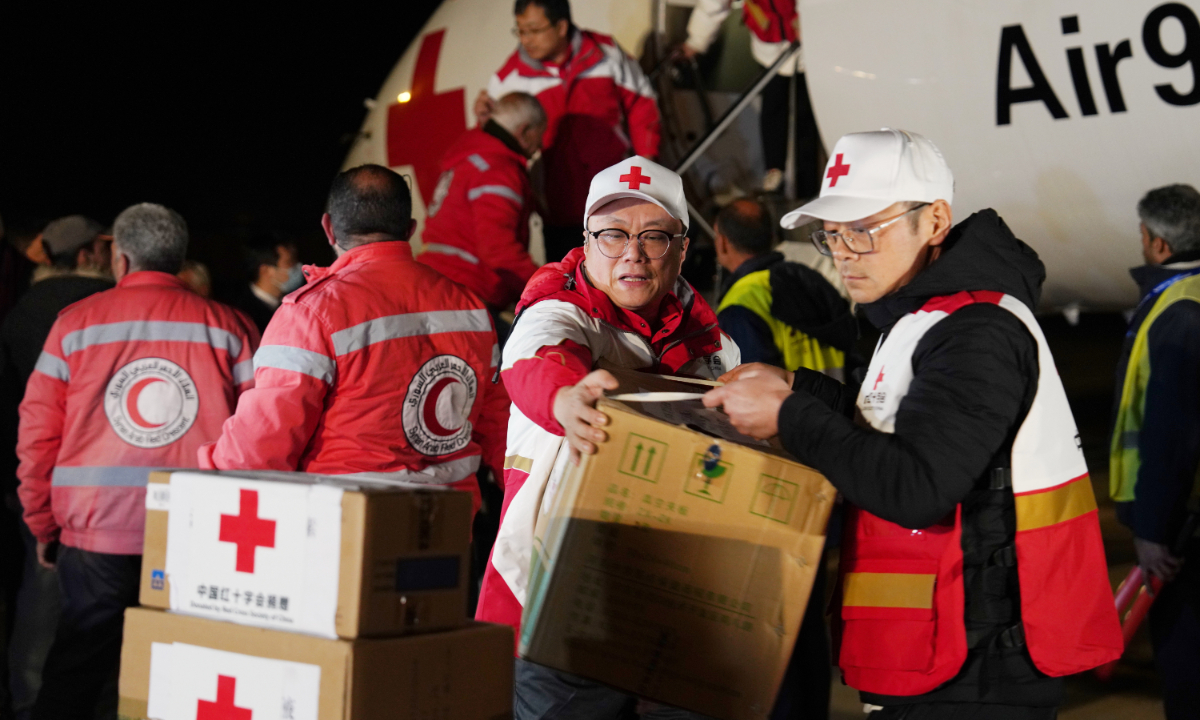
The first batch of medical assistance from China arrives in earthquake-stricken Syria on February 9, 2023 with more on their way. Photo:VCG
In an exclusive interview with the Global Times on Thursday, Mohammed Hasanein Khaddam, Syrian Ambassador to China, said that Syrians' suffering has been exacerbated by the disaster, but its root cause is the US' long-arm jurisdiction.
"Many people are still under the rubble," the ambassador said. Buildings and infrastructure have been hit hard. Tens of thousands became homeless because large numbers of buildings are dilapidated and uninhabitable due to the first quake and the aftershocks, so the number of deaths is in the thousands and on the rise, with hospitals and medical centers overstretched.
Syrian Arab Red Crescent (SARC) President Khaled Hboubati on Tuesday called on the US and the West to lift sanctions on Syria to facilitate relief efforts, as the country is in dire need of rescue equipment.
Many countries, including China, also urged the US and the EU to lift economic sanctions to speed up emergency response and rescue work.
However, the parties that have imposed the sanctions appeared to be deaf to the calls, claiming that they do not target legitimate humanitarian assistance. US Secretary of State Antony Blinken said in a release on Thursday that the US has provided assistance in close coordination with partner organizations in Syria.
Given the severe situation in Syria, it will be hard for a few organizations or people to effectively organize rescue and assistance, let alone the limited sphere of activities of the "organizations" mentioned by the US. Large-scale rescue work cannot be carried out without the organization of the Syrian government, said Ding.
"The US should lift the sanctions, as civilians are those who are suffering the most. It should show sympathy, even though it doesn't have much, to the Syrian civilians," said Ding.
The UN Refugee Agency told the Global Times that they echo the sentiments expressed by UN Secretary General Antonio Guterres, who said on Thursday, "This is a moment in which everybody must make very clear that no sanctions of any kind should interfere with relief to the population of Syria in the present moment."
Mick Wallace, a member of the European Parliament, tweeted on Tuesday that if the EU really cares about these people, "could they show it by ending their illegal sanctions on Syria which have killed so many innocent people?"
Blinken, the US' top diplomat, boasted in a tweet that the US was the "leading humanitarian donor" and the aid will "go to Syrian people, not the regime," to which Chinese Foreign Ministry spokesperson Hua Chunying commented: "Then why are they struggling? You've been bombing, sanctioning, and stealing from them, and now you praise yourself for your charity?"
The US' hypocrisy has been fully exposed in Syria. On the one hand, it imposes unilateral sanctions to isolate the country and strangle its development opportunities, leaving helpless Syrians digging their loved ones buried in rubble with their bare hands; and on the other, the US continues to exploit Syrian resources, especially its oil, by either directly stealing it through smuggling tankers or "buying" at unreasonably low prices, Ding said.
The US' apathy toward the Syrian peoples' misery shows how hollow its touting of human rights or democracy is, said the expert.



